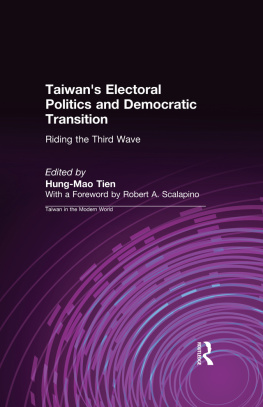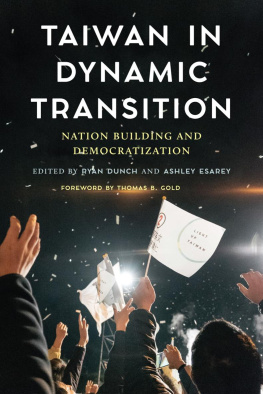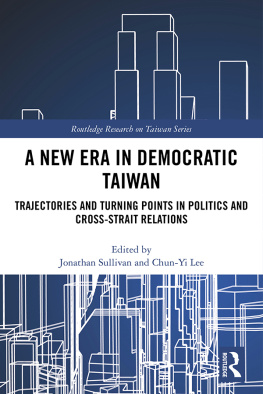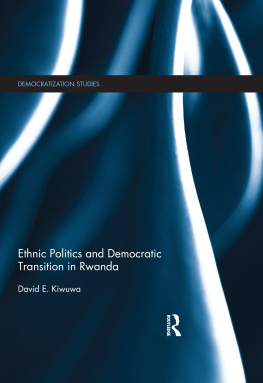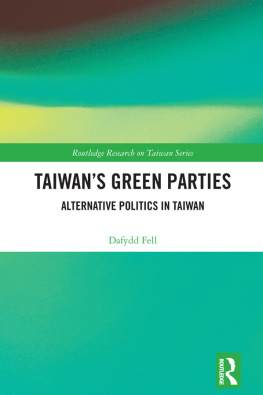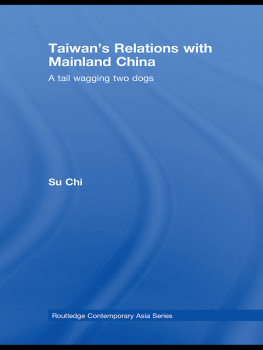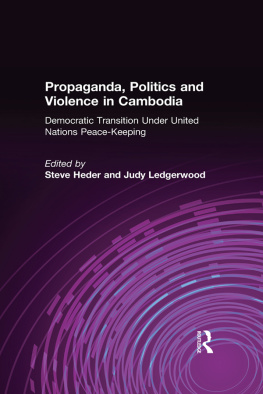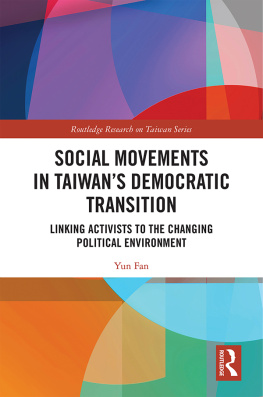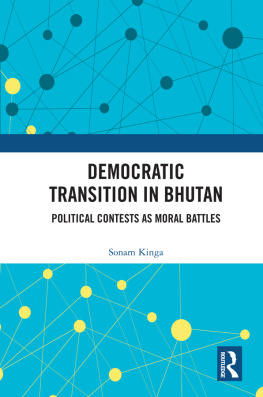Hung-Mao Tien - Taiwans Electoral Politics and Democratic Transition: Riding the Third Wave
Here you can read online Hung-Mao Tien - Taiwans Electoral Politics and Democratic Transition: Riding the Third Wave full text of the book (entire story) in english for free. Download pdf and epub, get meaning, cover and reviews about this ebook. year: 1995, publisher: Routledge, genre: Politics. Description of the work, (preface) as well as reviews are available. Best literature library LitArk.com created for fans of good reading and offers a wide selection of genres:
Romance novel
Science fiction
Adventure
Detective
Science
History
Home and family
Prose
Art
Politics
Computer
Non-fiction
Religion
Business
Children
Humor
Choose a favorite category and find really read worthwhile books. Enjoy immersion in the world of imagination, feel the emotions of the characters or learn something new for yourself, make an fascinating discovery.
- Book:Taiwans Electoral Politics and Democratic Transition: Riding the Third Wave
- Author:
- Publisher:Routledge
- Genre:
- Year:1995
- Rating:3 / 5
- Favourites:Add to favourites
- Your mark:
- 60
- 1
- 2
- 3
- 4
- 5
Taiwans Electoral Politics and Democratic Transition: Riding the Third Wave: summary, description and annotation
We offer to read an annotation, description, summary or preface (depends on what the author of the book "Taiwans Electoral Politics and Democratic Transition: Riding the Third Wave" wrote himself). If you haven't found the necessary information about the book — write in the comments, we will try to find it.
Hung-Mao Tien: author's other books
Who wrote Taiwans Electoral Politics and Democratic Transition: Riding the Third Wave? Find out the surname, the name of the author of the book and a list of all author's works by series.
Taiwans Electoral Politics and Democratic Transition: Riding the Third Wave — read online for free the complete book (whole text) full work
Below is the text of the book, divided by pages. System saving the place of the last page read, allows you to conveniently read the book "Taiwans Electoral Politics and Democratic Transition: Riding the Third Wave" online for free, without having to search again every time where you left off. Put a bookmark, and you can go to the page where you finished reading at any time.
Font size:
Interval:
Bookmark:
Riding the Third Wave
Edited by Hung-mao Tien
1945 to the Present
Edited by Murray A. Rubinstein
National Identity and Democratization
Alan M. Wachman
Edited by Joel D. Aberbach, David Dollar, and Kenneth L. Sokoloff
The Lukang Rebellion
James Reardon-Anderson
Edited by N.T. Wang
Beyond the Economic Miracle
Edited by Denis Fred Simon and Michael Ying-mao Kau
Edited by Harvey J. Feldman
Mission, Seminary, and Church
Murray A. Rubinstein
Edited by Edwin A. Winckler and Susan Greenhalgh
Thomas B. Gold
Ming-tong Chen
Tun-jen Cheng
Yun-han Chu
Bruce J. Dickson
John Fuh-sheng Hsieh
Yung-min Hsu
Teh-fu Huang
Tse-min Lin
I-Chou Liu
William L. Parish
Chyuan-Jenq Shiau
Editor
Robert A. Scalapino



2 Park Square, Milton Park, Abingdon, Oxon OX14 4RN
711 Third Avenue, New York, NY 10017, USA.
No responsibility is assumed by the publisher for any injury and/or damage to persons or property as a matter of products liability, negligence or otherwise, or from any use of operation of any methods, products, instructions or ideas contained in the material herein.
p. cm.
"An East gate book."
Includes bibliographical references and index.
ISBN 1-56324-670-8 (hardcover : alk. paper). ISBN 1-56324-671-6 (pbk. : alk. paper)
1. ElectionsTaiwan.
2. Local electionsTaiwan.
3. DemocracyTaiwan.
4. TaowamPolitics and government1988
I. Tien, Hung-mao, 1938 . II. Series.
JQ1538.T353 1995
324.95124'905dc20
95-627
CIP
ISBN 13: 9781563246708 (hbk)
| Robert A. Scalapino |
| Hung-mao Tien |
| William L. Parish and Charles Chi-hsiang Chang |
| Bruce J. Dickson |
| Yun-han Chu and Tse-min Lin |
| Teh-fu Huang |
| Tun-jen Cheng and Yung-ming Hsu |
| Ming-tong Chen |
| John Fuh-sheng Hsieh |
| Chyuan-Jenq Shiau |
| I-Chou Liu |
Font size:
Interval:
Bookmark:
Similar books «Taiwans Electoral Politics and Democratic Transition: Riding the Third Wave»
Look at similar books to Taiwans Electoral Politics and Democratic Transition: Riding the Third Wave. We have selected literature similar in name and meaning in the hope of providing readers with more options to find new, interesting, not yet read works.
Discussion, reviews of the book Taiwans Electoral Politics and Democratic Transition: Riding the Third Wave and just readers' own opinions. Leave your comments, write what you think about the work, its meaning or the main characters. Specify what exactly you liked and what you didn't like, and why you think so.

